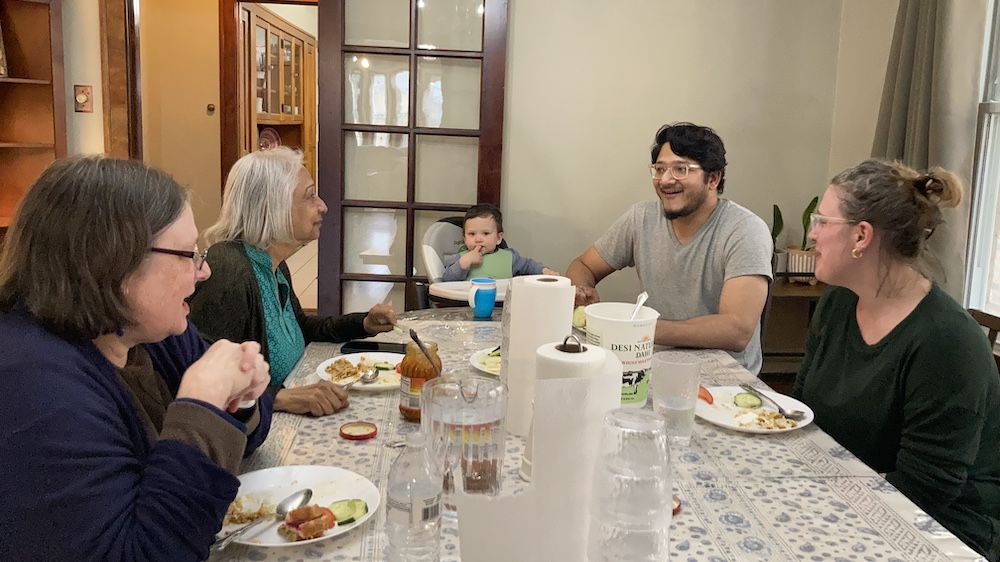About the Author
Linda Piepenbrink is a senior editor in Marketing Communications and the managing editor of Alumni & Friends magazine with Moody Bible Institute.
This site uses cookies to provide you with more responsive and personalized service and to collect certain information about your use of the site. You can change your cookie settings through your browser. If you continue without changing your settings, you agree to our use of cookies. See our Privacy Policy for more information.

This is the second in a four-part series on how Moody Bible Institute's Practical Christian Ministries are serving refugees in Chicago's Little India neighborhood. Click here to read part one. Photo by Linda Piepenbrink
Bonnie Hill is a sophomore at Moody Bible Institute who lives in Little India in a cohort with a few other women from Moody. She serves with Devon Oasis, doing in-home tutoring and forming relationships with refugees for her Practical Christian Ministry (PCM). Every Wednesday night, she and Jake Carson, a junior, visit the home of a family with two teenagers.
“I help the high school girl with homework, and Jake helps the high school boy. Then we chat,” she says. “We wouldn’t have known them apart from PCM, and they live right down my street!”
Near the corner of Western and Devon Avenues, Alyssa Grunden, a 2018 graduate of Moody, supervises the homework center at Devon Oasis, where Moody students Ariana Brown, Carson Allen, and Lydia Roseboom are having fun helping refugee kids. Before graduating from Moody, this was Grunden’s PCM for four years. She loved it so much she became a missionary to the community.
While Allen works on spelling words with an Indian boy named Arhan, Grunden works with Pakistani siblings Cheyenne and older brother Uzar. In the next room it’s mostly playtime as 6-year-old Moazan cheers after hitting a target with a balloon and his 7-year-old brother, Momin, celebrates after winning a game of Uno against Eshal, a Malaysian kindergartener, and Roseboom, their tutor.
Meanwhile Brown lets Ade, an Ethiopian girl, pick out a prize for memorizing the weekly Bible verse on the flat screen, 1 Corinthians 15:3–4. Ade chooses a splat ball, which she enjoys tossing at the wall and watching it peel off until it sticks to the ceiling and has to be rescued with a broom handle.
“For me, PCM is one of the most important things we do as Moody students,” says Roseboom, an elementary education major who grew up in a missionary family in Southeast Asia. “I think the way Moody has most prepared me is in teaching me to love the nations.”
The South Asian Friendship Center has been a presence in Little India for 25 years. Started by Dr. Samuel Naaman, an intercultural ministries professor at Moody and president/interim director of SAFC, the organization has trained hundreds of Moody students to support South Asians through women’s Bible studies, ESL classes, homework center tutoring, a monthly bilingual service in Hindu/Urdu and English and ASHA Outreach, a PCM that seeks to restore women caught in sex trafficking.
Sunita Rodricks, who grew up in India, has been the director of women’s ministries at SAFC since 1997. She refers to the women she’s mentored as “my kids,” and they call her “Aunty.” Emily Taylor, a junior, is one of them. She tutors students at SAFC and visits with their parents during her PCM on Thursday afternoons.
“I came to Moody because of PCMs,” Taylor says. “I just love the idea of meeting tangible needs of the community. I wanted to do ministry, and the fact that it’s required by Moody—they hold me to that commitment, and I really love that.”
Taylor has richly benefited from her PCM, even accompanying Rodricks to a Hindu friend’s house, where she practiced some important “cultural rules.”
Photo caption: Moody students help lead a women's bilingual service hosted by the South Asian Friendship Center in an upper room of Sabka Sahaara, a church in Chicago's Little India neighborhood.
“Aunty Sunita has helped me so much because she is such a good discipler,” Taylor says. “When we tell stories from the Bible, she’ll say, ‘Tell this story because it will make sense in her culture,’ or ‘Accept all the food that she gives to you if she offers you anything,’ or, she’ll say you have to say, ‘Oh, I would love to stay, I would love to stay, but I have to go.’”
During a recent bilingual women’s service in Hindi/Urdu and English, Rodricks translated as Taylor told the Bible account of the paralyzed man lowered down through the roof and healed by Jesus. Why that story?
“It’s important to distinguish Jesus from other gods because Hindus will accept Jesus, but they’ll accept him as one of their gods,” Taylor says. “So they need to see that Jesus is all-powerful. It’s important to tell the story of God first in a way that makes sense in someone’s cultural context. There are so many different backgrounds that people come from, and it’s vital to understand those things before you just willy-nilly go off, assuming that they understand.”
Taylor has also learned to adapt and let go of things, like the concept of time. “Everything starts what I perceive to be late, but to them it’s not late. Even church always starts 30 minutes late,” says Taylor, who attends Sabka Sahaara, a vibrant missional church on Devon Avenue in Little India.
Linda Piepenbrink is a senior editor in Marketing Communications and the managing editor of Alumni & Friends magazine with Moody Bible Institute.

